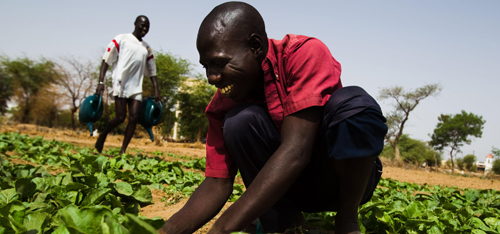Supporting competitiveness and sustainable intensification of African cotton sectors through capacity development on integrated production and pest management
Cotton is an important cash crop in many African countries, significantly boosting export earnings and providing a living to millions of smallholder farmers. However, difficulties including limited access to technologies and equipment, insufficient agricultural extension services and depleted natural resources, are driving down the sector's productivity and, ultimately, its profitability.
FAO is working with the European Union to turn that around through a project titled "Supporting competitiveness and sustainable intensification of African cotton sectors through capacity development on integrated production and pest management (IPPM)" (GCP/RAF/482/EC). The project, which runs from 2013 to 2016, aims to contribute to healthy cotton sectors in Burkina Faso, Mali, Senegal, Tanzania and Zambia, and to increase the incomes of cotton farming families.
The project is an implementation mechanism of the "Support Programme for the Consolidation of the Action Framework under the European Union-Africa Partnership on Cotton". It is also in line with the regional strategies of COMESA and UEMOA to promote cotton and textile sector development, and builds upon achievements made through the "All African, Caribbean and Pacific Agricultural (ACP) Programme on Agricultural Commodities, Including Cotton".
Sustainable intensification through IPPM / FFS activities
To date, in its first year of implementation, the project has strengthened the technical capacity of 153 facilitators (trainers of farmers) previously trained on IPPM through the All ACP Programme, and has trained 127 new facilitators on IPPM methods to boost cotton production sustainably.
These facilitators, in turn, have trained a total of 4 291 cotton farmers through season-long farmer field schools, introducing them to new cropping practices and technologies to promote healthy crop growth, and pest and disease management. An important part of the IPPM training involves raising awareness among farmers of the environmental and human health risks of pesticides, which are often used in heavy doses to grow cotton. It also educates farmers on techniques to improve productivity and the ecology of plant pests and their natural enemies, encouraging them to reduce pesticide use in favour of biological control.
The project has sought to build partnerships with cotton companies, research organizations and other programmes and organizations involved in the cotton sector in order to create synergies and share resources. It has also made efforts to inform decision-makers throughout the region of the long-term benefits of adopting the IPPM approach in growing cotton.
Partners
FAO works with various partners to achieve these goals, including: Common Market for Eastern and Southern Africa, West African Economic and Monetary Union, International Trade Center; Ministries of Agriculture and livestock; cotton companies including Alliance Ginneries Tanzania, Cargill Zambia, Compagnie malienne pour le développement du textile, Continental Zambia, Grafax Zambia, Office de la Haute Vallée du Niger, Société de Développement des Fibres Textiles, Mumbwa Farmers Ginning and Pressing Company of Zambia; Zambia Cotton Ginners Association; cotton producer organizations and associations including Association des Producteurs de Coton Africains, Cotton Association of Zambia, Fedération Nationale des Producteurs de Coton du Sénégal, Union Nationale des Producteurs de Coton du Burkina Faso, Union Nationale des Societés Coopératives des Producteurs de Coton du Mali; cotton interprofessional bodies such as Assemblée Permanente des Chambres d’Agriculture du Mali, Cotton Board of Zambia, Tanzania Cotton Board; national and regional research institutions including Cotton Development Trust of Zambia, Institut d’Economie Rurale du Mali; Institut National d’Environnement et Recherches Agricoles du Burkina Faso, Ukiriguru Research Institute of Tanzania; and national and international programmes and initiatives, namely Programme Régional de Protection Intégrée du Cotonnier en Afrique, Programme d’Appui aux Filières Coton Textile and Better Cotton Initiative.
Informal collaborations have been developed with: Centre de coopération internationale en recherche agronomique pour le développement, International Institute for Tropical Agriculture, Brazil’s ABC-EMBRAPA’s Projet C4, Cotton Made in Africa, COMPACI programme and Tanzania Gatsby Trust.
This project is funded by the European Union and implemented by FAO.

